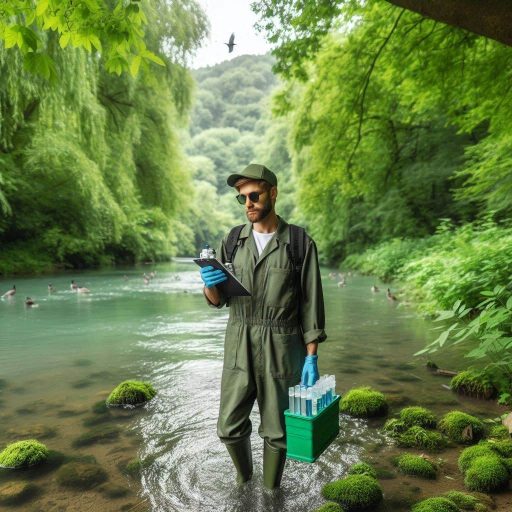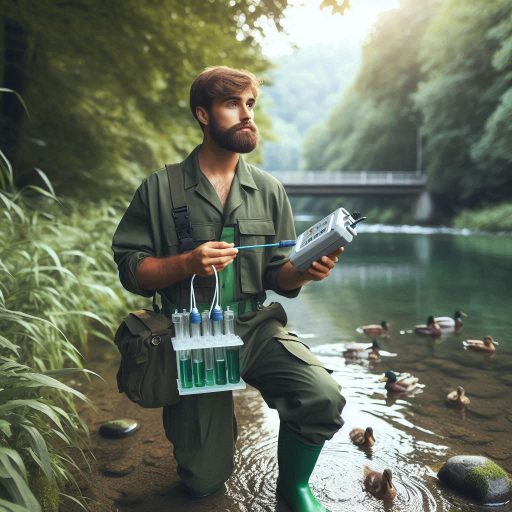Introduction
An environmental technician specializes in managing and mitigating environmental impacts on environmental Technician Emergency Response.
They monitor pollution levels and ensure compliance with regulations.
In emergency situations, their role becomes critical.
Emergency response involves addressing and controlling environmental hazards caused by spills, leaks, or accidents.
Environmental technicians act swiftly to contain and clean up hazardous materials, minimizing damage and health risks.
They assess the situation, implement containment measures, and coordinate with other responders to manage the incident effectively.
These technicians use specialized equipment to detect and analyze contaminants, ensuring accurate and timely response.
They follow established protocols to handle hazardous substances safely and prevent further environmental damage.
Their actions are crucial in protecting both human health and wildlife from the adverse effects of environmental emergencies.
Environmental technicians also help develop emergency response plans and train personnel.
They provide expertise on best practices for handling hazardous materials and ensure that all safety procedures are in place.
Their proactive planning and training efforts enhance preparedness for potential incidents.
Environmental technicians play a vital role in emergency response by managing hazardous situations and minimizing environmental damage.
Role of environmental technician in emergency response
Environmental technicians play a crucial role in emergency response situations, as they are responsible for assessing and mitigating environmental risks that may arise during a disaster.
Conducting Environmental Assessments
One of the primary responsibilities of environmental technicians in emergency response is to conduct thorough environmental assessments to identify potential hazards and risks to human health and the environment.
They must assess the extent of contamination, determine the source of pollution, and evaluate the impact on air quality, water quality, and soil quality.
Monitoring Air Quality and Water Contamination Levels
Environmental technicians are tasked with monitoring air quality and water contamination levels to ensure that the surrounding environment is safe for residents and emergency response personnel.
They use specialized equipment to measure pollutants in the air, such as particulate matter, volatile organic compounds, and carbon monoxide.
Similarly, they test water samples from rivers, streams, and groundwater sources to detect contaminants like heavy metals, chemicals, and pathogens.
Implementing Cleanup and Remediation Plans
Another critical role of environmental technicians in emergency response is to develop and implement cleanup and remediation plans to restore the affected area to its pre-disaster condition.
They work closely with environmental engineers, public health officials, and government agencies to coordinate the cleanup efforts effectively.
Technicians may use a variety of techniques, such as containment barriers, absorbent materials, and bioremediation methods, to remove contaminants and restore environmental quality.
Overall, the role of environmental technicians in emergency response is essential for protecting human health and the environment in times of crisis.
Read: Online Courses for Surveying and Mapping Technicians
Importance of Environmental Technicians in Emergency Response
Protecting Public Health and Safety
Environmental technicians play a crucial role in protecting public health and safety during emergencies.
When incidents like chemical spills or hazardous waste leaks occur, technicians respond quickly.
They assess the situation to determine the immediate risks to people.
Technicians deploy safety measures to minimize exposure to toxic substances.
They use protective equipment and follow safety protocols to safeguard themselves and the public.
Technicians also help in evacuating affected areas if necessary.
They coordinate with emergency services to ensure an organized response.
By providing accurate information about the contamination, technicians enable first responders to make informed decisions.
Their actions help prevent health crises and reduce the impact on local communities.
Minimizing Environmental Damage and Pollution
During emergencies, environmental technicians work to minimize environmental damage and pollution.
They assess the extent of the contamination and identify potential sources of pollution.
Technicians implement containment strategies to prevent the spread of hazardous materials.
They use barriers and absorbents to control spills and leaks, reducing the risk of further environmental damage.
Technicians also monitor the affected area for signs of ongoing contamination.
They collect samples from soil, water, and air to track pollution levels.
By analyzing these samples, they evaluate the effectiveness of the containment measures.
Technicians may also oversee cleanup operations, ensuring that contaminated materials are properly removed and disposed of.
Ensuring Compliance with Regulations and Standards
During emergencies, environmental technicians work to minimize environmental damage and pollution.
They assess the extent of the contamination and identify potential sources of pollution.
Technicians implement containment strategies to prevent the spread of hazardous materials.
They use barriers and absorbents to control spills and leaks, reducing the risk of further environmental damage.
Technicians also monitor the affected area for signs of ongoing contamination.
They collect samples from soil, water, and air to track pollution levels.
By analyzing these samples, they evaluate the effectiveness of the containment measures.
Technicians may also oversee cleanup operations, ensuring that contaminated materials are properly removed and disposed of.
Read: Surveying and Mapping Technician: Job Satisfaction
Skills and qualifications required for environmental technicians
Knowledge of Environmental Science and Regulations
Environmental technicians must possess a deep understanding of environmental science and regulations.
They need to know how different substances affect ecosystems and human health.
This knowledge helps them assess the potential impact of hazardous materials during emergencies.
Technicians must be familiar with local, state, and federal regulations governing hazardous waste and emergency response.
Understanding these regulations ensures that technicians comply with legal requirements during emergencies.
They follow protocols to manage and contain spills, leaks, or other environmental hazards.
Technicians use their knowledge to evaluate risks and implement effective response strategies.
Their expertise helps protect both the environment and public health during critical situations.
Training in Hazardous Materials Handling and Emergency Response Procedures
Effective emergency response requires specialized training in hazardous materials handling and emergency procedures.
Technicians receive training on how to manage various types of hazardous substances safely.
This includes learning proper containment methods and disposal techniques.
They also train in the use of personal protective equipment (PPE) to ensure their safety during emergencies.
Emergency response training covers procedures for different types of incidents, such as chemical spills or fires.
Technicians practice how to assess the situation, contain the hazard, and minimize environmental damage.
They learn to coordinate with other emergency services and follow established response plans.
This training prepares them to handle emergencies efficiently and effectively, reducing the impact of hazardous materials on the environment and public safety.
Strong Communication and Problem-Solving Skills
Strong communication and problem-solving skills are essential for environmental technicians in emergency situations.
Technicians must communicate clearly with team members and other stakeholders.
Effective communication ensures that everyone involved understands their roles and responsibilities.
It also helps in coordinating response efforts and conveying critical information.
Problem-solving skills enable technicians to quickly assess situations and determine the best course of action.
They analyze the immediate risks and develop strategies to address them.
Technicians often face unpredictable challenges during emergencies and must adapt their plans accordingly.
Their ability to think critically and make informed decisions is crucial for managing and mitigating hazardous incidents.
Read: Field vs. Office Work in Surveying and Mapping

Challenges Faced by Environmental Technicians in Emergency Response
Handling High-stress Situations and Time Constraints
Environmental technicians often find themselves in high-stress situations during emergency responses.
The pressure to act quickly and efficiently can be overwhelming.
They must make split-second decisions that can have significant consequences.
In addition, time constraints can further exacerbate the stress levels.
Environmental technicians must work under tight deadlines to assess and mitigate environmental hazards.
The need to act swiftly to prevent further damage adds to the already stressful situation.
Dealing with Exposure to Hazardous Materials and Risks to Personal Safety
Coordinating with Other Emergency Responders and Agencies:
Environmental technicians must work closely with other emergency responders and agencies during a crisis.
This collaboration is essential for a coordinated and effective response.
However, it can present challenges in terms of communication, decision-making, and resource allocation.
Effective coordination requires clear communication channels and a shared understanding of roles and responsibilities.
Transform Your Career Today
Unlock a personalized career strategy that drives real results. Get tailored advice and a roadmap designed just for you.
Start NowCoordination with other emergency responders and agencies
Environmental technicians must be able to work seamlessly with firefighters, paramedics, law enforcement, and other stakeholders to address environmental issues in a timely and efficient manner.
Environmental technicians play a crucial role in emergency response efforts.
Despite the challenges they face, including high-stress situations, exposure to hazardous materials, and coordination with other responders, they remain committed to protecting public health and the environment.
By overcoming these challenges through training, preparation, and teamwork, environmental technicians can help mitigate the impact of environmental disasters and ensure a safer, healthier future for communities in need.
Read: Top Surveying and Mapping Technician Employers
Best practices for environmental technicians in emergency response
Environmental technicians play a crucial role in emergency response situations, where their expertise and training are essential for assessing and mitigating environmental hazards.
Here are some best practices for environmental technicians in emergency response:
Prioritizing Safety and Following Protocols
In emergency response, environmental technicians prioritize safety above all else.
They follow established protocols to manage hazardous situations effectively.
Adhering to these protocols helps minimize risks to both personnel and the environment.
Technicians must wear appropriate personal protective equipment (PPE) during emergencies.
They also follow specific safety procedures to handle hazardous materials.
This ensures that their actions do not exacerbate the situation.
Emergency response protocols are designed to manage various scenarios.
Technicians must be familiar with these protocols to act quickly and efficiently.
Regular training helps them stay prepared for any emergency.
Communicating Effectively with Team Members and Stakeholders
Effective communication is crucial during an emergency.
Environmental technicians must clearly convey information to team members and stakeholders.
This involves providing updates on the situation and any immediate actions required.
Technicians coordinate with other emergency responders, such as firefighters and medical personnel.
Clear communication helps ensure that everyone involved understands their roles and responsibilities.
Miscommunication can lead to delays or mistakes in managing the emergency.
They also interact with stakeholders, including regulatory agencies and the public.
Technicians provide accurate information about the incident and ongoing response efforts.
This transparency helps maintain trust and ensures that all parties are informed.
Documenting Activities and Findings for Future Reference
Documentation is an essential aspect of emergency response.
Environmental technicians record all actions taken during an incident.
This includes noting the measures implemented and any issues encountered.
Detailed records help in evaluating the effectiveness of the response.
They provide a basis for reviewing what worked well and what could be improved.
This information is valuable for refining response strategies and training for future incidents.
Post-incident reports are crucial for regulatory compliance.
Technicians compile comprehensive reports that include findings, actions taken, and outcomes.
These reports are often required by regulatory agencies and can influence future safety practices.
You Might Also Like: Biomedical Engineering: Robotics in Medicine
Training and Career Development Opportunities for Environmental Technicians
As an Environmental Technician, being prepared for emergency response situations is crucial to ensuring the safety of individuals and the environment.
Here are some key aspects of training and career development opportunities for environmental technicians:
Certifications in Hazardous Waste Operations and Emergency Response
Environmental technicians must hold specific certifications to excel in hazardous waste operations and emergency response.
Certifications such as the Hazardous Materials Technician (HMT) and Certified Hazardous Materials Manager (CHMM) are essential.
These credentials validate their ability to handle hazardous materials safely and effectively.
The HMT certification focuses on emergency response skills, including spill containment and decontamination procedures.
This certification prepares technicians for real-world scenarios involving hazardous materials.
The CHMM certification, on the other hand, emphasizes comprehensive knowledge of hazardous materials management, from regulations to best practices.
Obtaining these certifications often involves passing rigorous exams and completing required training hours.
Technicians must also demonstrate practical experience in handling hazardous waste and emergency situations.
These credentials not only enhance their skills but also boost their credibility in the field.
Continuing Education in Environmental Science and Technology
Continuing education is crucial for environmental technicians to stay current with advancements in environmental science and technology.
The field evolves rapidly, with new technologies and regulations emerging regularly.
Technicians must engage in ongoing learning to remain effective in their roles.
Many institutions and organizations offer specialized courses and workshops in environmental science and technology.
These programs cover topics such as advanced waste treatment methods, new environmental regulations, and cutting-edge technologies.
Enrolling in these courses helps technicians expand their knowledge and apply new techniques in their work.
Additionally, attending conferences and seminars provides opportunities to learn from experts and peers.
These events often feature presentations on the latest research and developments in environmental science.
Technicians who actively participate in continuing education are better equipped to handle complex environmental challenges.
Networking with Professionals and Seeking Mentorship
Networking with other professionals in the environmental field is a valuable strategy for career development.
Connecting with peers, mentors, and industry leaders provides insights into best practices and emerging trends.
Networking can also open doors to new career opportunities and collaborations.
Seeking mentorship from experienced professionals offers guidance and support for career advancement.
Mentors provide valuable advice on navigating the challenges of the field and developing specialized skills.
They can also share their experiences and knowledge, helping technicians avoid common pitfalls.
Participating in professional organizations and attending industry events are effective ways to build a strong network.
These platforms allow technicians to meet others in their field, exchange ideas, and learn from each other.
A robust professional network and strong mentorship relationships contribute significantly to career growth and success.
Delve into the Subject: Project Management in Industrial Engineering
Conclusion
In times of emergencies, environmental technicians play a critical role in managing and responding to environmental hazards.
These professionals are trained to assess the situation quickly and efficiently to mitigate risks and protect human health.
They are responsible for collecting samples, monitoring air quality, water quality, and soil contamination levels in emergency response scenarios.
Environmental technicians work closely with emergency responders to ensure that hazardous materials are handled safely and effectively.
Their role is vital in preventing further environmental degradation and the spread of pollutants in the event of a disaster.
Showcase Your Business Today
Reach thousands of readers actively exploring professional services. Publish your business profile and grow your audience now.
Publish NowEnvironmental technicians also assist in developing and implementing cleanup and remediation plans to restore impacted areas.
They play a key role in documenting and reporting findings to regulatory agencies and stakeholders to ensure transparency and compliance.
Overall, environmental technicians are indispensable members of emergency response teams, providing crucial support in safeguarding public health and the environment.
[E-Books for Sale]
The Big Book of 500 High-Paying Jobs in America: Unlock Your Earning Potential
$19.99 • 500 High-Paying Jobs • 330 pages
Explore 500 high-paying jobs in America and learn how to boost your career, earn more, and achieve success!
See All 500 High-Paying Jobs of this E-Book
1001 Professions Without a Degree: High-Paying American Jobs You Can Start Now
$19.99 • 1001 Professions Without a Degree • 174 pages
Discover 1001 high-paying jobs without a degree! Unlock career tips, skills, and success strategies for just $19.99!




